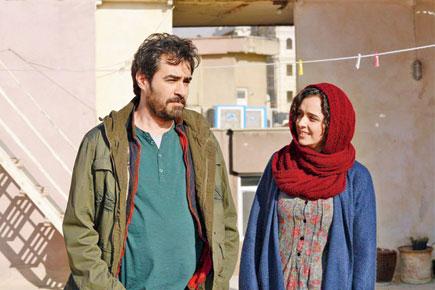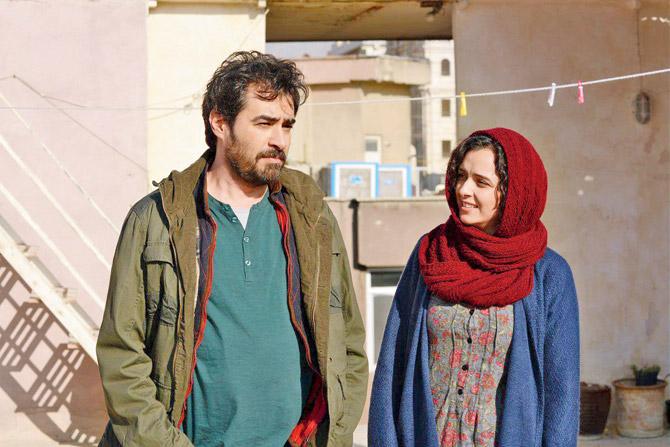Watch Asghar Farhadi's The Salesman, and soak in a very internal experience that only the best novels and finest films can offer


A still from the film, The Salesman
ADVERTISEMENT
 With certain rare movies, like it is with people, or relationships, you may forget what they were actually like. What you cannot help but live with is what they did to you. Or how they made you feel. For me, 123 minutes of Asghar Farhadi's A Separation (2011) will hardly be as much about its plot per se, as the memory of staggering alone out of my quiet bedroom, walking around the hall, with slight emptiness in my head, soaking in an experience so subtle and internalised that it could only be equated with, if not elevated to, literary fiction.
With certain rare movies, like it is with people, or relationships, you may forget what they were actually like. What you cannot help but live with is what they did to you. Or how they made you feel. For me, 123 minutes of Asghar Farhadi's A Separation (2011) will hardly be as much about its plot per se, as the memory of staggering alone out of my quiet bedroom, walking around the hall, with slight emptiness in my head, soaking in an experience so subtle and internalised that it could only be equated with, if not elevated to, literary fiction.
A Separation was a gripping moral drama. As is Farhadi's latest, The Salesman - where tables turn by the minute. As do your sympathies. The filmmaker effectively replicates the rhythm of life itself, and his characters have a gently warming effect on you, as though you've known them for years. Much like Pedro Almodovar's Spanish masterpiece All About My Mother (1999), set against Tennessee Williams's play A Streetcar Named Desire - constantly in the backdrop of The Salesman, is Arthur Miller's Death Of A Salesman that the lead character, a school teacher, performs and directs, along with his wife, and the troupe. The play within the film is in Farsee, in the same way that actor Satish Kaushik performs Miller's work in Hindi as Salesman Ramlal to much deserved applause in Bombay.
At the centre of The Salesman, besides its remarkable moral core, is a tragedy that occurs with the lead character's wife. She is attacked in her own house. And we don't know who could have done it. Or why. This is not a whodunit in as much as it is an essay on empathy, humanism, both of which have combined rather well to produce some of the finest Iranian films over the past couple of decades, whether by directors like Majidi, Panahi, Makhmalbaf, Kiarostami, or Farhadi himself. That such directors' influence on world cinema - almost as strong as the French New Wave in the '50s - is only likely to grow, can be gauged from the shrinking size of the screen. The big theatre calls for massive magic shows, consumed collectively, almost like a tribal experience.
Platforms like Netflix have really turned films into individual engagements - not very different from the novel. The Iranians, although their art-house cinema is mostly funded by the West, already have an edge over this new medium. Why though? Majidi, who's shooting his first Indian film, says it was the 1979 Iranian revolution that tilted the curve. Which is odd. His country has since been under the control of Shia clerics. And yet Iranian cinema is seeped in irreligious, human emotions. So then?
Outside of New York, Tehran (where The Salesman is set) remains the only city I've ever wanted to go back to. Why bother otherwise, when there's so much else in the world to see? But, well, there's hardly a megapolis like Tehran - 1/6th the population of the country, possibly the youngest city in the world, full of bloggers and atheists, who, much like Iranian movies - defies all that you've read about a conservative society in the popular press. The women, while fully clothed, wearing Versace hijab, train in martial arts; have higher enrolment in colleges than men; and they completely call the shots at home. The boys love football, music, and movies, of course. At least pre-Tinder, girls would flash their phone numbers in placards from their cars to boys at traffic signals, away from prying eyes of the moral policemen on the street that they never actually elected anyway.
The 1979 Iranian Revolution to overthrow the pro-American Shah, of the Pahlavi dynasty, was orchestrated by civil society that comprised leftists, liberals, seculars, and religious conservatives. Inspired by economic growth since the oil boom in the '70s, people were upset that their GDP was temporarily flagging, coupled with rise in corruption at the top.
Having displaced the monarchy but unable to find a suitable captain they could all agree on, the civil society brought down the exiled leader Ayatollah Khomeini from Paris to take over reins of government, and generate economic growth, perhaps. Everyone was aware he could be sidelined. I'm told the Ayatollah had much semi-urban/rural support. Mixing religion with politics tends to produce governments deeply intolerant of values and views separate from their own. This is the sort of schizophrenia Iran has since been suffering from. If you spot a possible Indian corollary, be concerned. It's certainly better than living in denial.
At this point, it's hard to find a people so radically different from the state as the sophisticated, urbane, inclusive Iranian young in Tehran. This reflects in their movies. Much like in India, for instance, where cinema, mainly created in Bombay and state capitals, is arguably more liberal than most of the nation.
Can excessive censorship, as India is experiencing currently, help create better art? Possibly. The Iranian filmmaker can't simply sail through with skin show, cathartic violence, or strong political statements. Their films hop, skip, and jump over censors to tell stories so deeply nuanced yet universal that they inevitably draw the world in. 125 minutes of The Salesman are just that. I've been sitting with a strange quietness in my head since I watched it this morning. I reckon you'll feel the same.
Mayank Shekhar attempts to make sense of mass culture.He tweets @mayankw14. Send your feedback to mailbag@mid-day.com
 Subscribe today by clicking the link and stay updated with the latest news!" Click here!
Subscribe today by clicking the link and stay updated with the latest news!" Click here!






